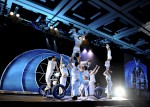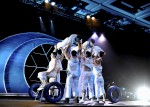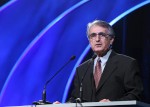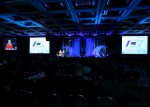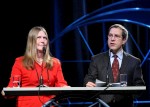
|
|

|
Monday, February 8, from 3:00 p.m. to 4:30 p.m., Room 200 Host : Mr. Pierre Villa The opening ceremony kicked off with the Congress participants experiencing their first Québec winter storm through an original multimedia presentation punctuated by impressive lightshows as well as an energetic performance by talented acrobats. |
||
- Visual animation
- Opening show
- President of the World Road Association, Ms. Anne-Marie Leclerc
- Mayor of the City of Québec, Mr. Régis Labeaume
- Canada Minister of Transport, Mr. John Baird
- Québec Minister of Transport, Ms. Julie Boulet
- Chairperson of the Technical Committee B5, Ms. Gudrun Öberg, and President of the Organizing Committee, Mr. Michel Boivin
- Final
Then some of the dignitatres said a few words, starting with the President of the Association.

President of the World Road Association,
Ms. Anne-Marie Leclerc
I would first like to tell you how happy I am to see so many of you here. There are over 830 participants here and I thank all of you for joining us here in the City of Québec. You have come to Québec in order to participate in this 13th edition of the International Winter Road Congress. This is a World Road Association (PIARC) congress and I thank you. You are participating in the first Winter Road Congress in the Americas.
On behalf of PIARC and its members, I would like to thank the Government of Québec, the host of this congress, the Government of Canada, the City of Québec and the Québec Minister of Transport for their very warm welcome.
Please allow me also to highlight the remarkable work of the Québec 2010 Organizing Committee. With the team from PIARC’s General Secretariat and in close collaboration with the Winter Service Technical Committee, these people have worked tirelessly over these last years to put together a most exceptional program. It now falls to us now to make these few days an opportunity for fruitful exchanges, lively discussions and sharing… In short, a complete success!
Snow, ice and the cold are realities shared by many countries. Road authorities must also cope with extreme and unpredictable events that directly affect the economy and life of our societies. As we speak, our American colleagues are snowed in Washington, D.C.
Climate change is disturbing what regulates the climate. In Europe, as in a number of states in the Americas, this situation is affecting road network users’ mobility and safety. The theme of this congress, “Sustainable Winter Service for Road Users,” is therefore more relevant now than ever before. Your discussions and the results of these exchanges will inspire the work of the Association and guide us towards solutions that will ensure safe and sustainable mobility.
The aim of this Congress is essentially to take stock of the best practices in winter road service; it also allows us to see what has been achieved since the Turin Congress in 2006, and discuss the issues that are of concern to the experts and decision-makers.
Over these few days, our exchanges and discussions will take place in a most appropriate environment. Québec and winter, you will notice, go hand in hand.
Each of you will have the opportunity to enrich your expertise with new learning, to confirm your analyses and practices, and establish avenues of research that, over the next few years, will form the framework of your work and the work of the Winter Service Technical Committee.
I therefore wish each and every one of you an excellent congress. Remember that its success now rests with each of you and your active participation in the program activities.
The ultimate objective, may I remind you, is to produce the most comprehensive situation report possible on winter service in order to guide us, our decision-makers and those committed to establishing sustainable mobility for all citizens over the years to come.
And on that note, I wish you all an excellent Congress!
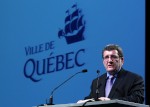
Mayor of the City of Québec, Mr. Régis Labeaume
It is a great pleasure for me to welcome you to the City of Québec on the occasion of this thirteenth Winter Road Congress.
This wonderful international forum presents a great opportunity to share experiences and expertise with hundreds of people, both specialists and citizens’ representatives, regarding the challenges faced by those states and cities that experience winter.
The strains of winter require us to outdo ourselves, to constantly imagine new solutions to mitigate the season’s impacts and constraints. Meetings, like those that we will have over the coming days, are essential so that we can share knowledge and develop networks based on interests and challenges.
I am certain that at the end of these three days, we will all see our problems a little differently and new solutions will emerge.
The City of Québec is the perfect place to hold this conference. It is a city that truly knows about winter—it is impossible to have five months of snow and cold every year and not be ready to deal with the elements in every way.
Over the centuries the City of Québec’s residents have learned to live with hundreds of centimetres of snow and spells of intensely cold weather.
Whether in travel, work or fun, winter is an integral part of our lives. A multitude of adaptations, often the fruit of the citizens’ imaginations, make the City of Québec a place that often, though perhaps not always, enjoys and embraces winter rather than struggling against its more daunting aspects.
In Québec we like winter so much that, for the last 56 years, we have celebrated it each year in what has become the biggest winter party in the world, the Carnaval de Québec. I invite all of you to participate and immerse yourselves in the Québec winter spirit. Go out and meet Québec’s citizens. You will immediately appreciate their warm welcome and their willingness to get to know you and show you their city.
Let me finish by wishing you a very good stay in the City of Québec, meet our people, you’ll find them very friendly and you’ll love them. Let me also wish you a very good Carnaval for the next days and spend a lot of money in town! Makes the mayor happy!
Enjoy the Congress, enjoy the Carnaval, and have a wonderful stay in our beautiful winter City of Québec!
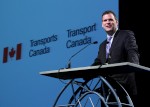
Canada Minister of Transport, Mr. John Baird
I’m very pleased to be with you today to welcome ministers and officials from all over the world to the City of Québec, to the great province of Québec, and to Canada.
I don’t know how many of you serve as a number of us do as elected officials. This is probably a unique problem that Canada has, but sometimes, in Canada, elected officials are said to get an ego, and to think highly of themselves. And that’s why it’s important that we spend time amongst our electorates. I gave a speech yesterday in my constituency. I walked in to give the speech, and there was about 200 people in the room, so I congratulated the organizer for the great crowd – as I want to do today, Anne-Marie – and he said : “You know, this is a good crowd, but when we get a good speaker, we can get three times as many people out.” [Laught] So, that’s why it’s important that elected officials spend time in their communities.
It naturally gives me great pleasure to welcome you to Canada on behalf of our government and of Prime Minister Stephen Harper. I would like to thank Anne-Marie Leclerc and the Government of Québec, as well as my provincial counterpart Julie Boulet for their good work. And thanks to you as well, Mayor Labeaume, for your city’s warm welcome to delegates from around the world.
Québec is probably the one area in Canada which does more to celebrate the winter than any other part of the country. And it’s obviously a great place to hold this great event. I want to also wish all of you who work in transport in various capacities from around the world, a special welcome to Québec. In Canada, our Trans-Canada highway has 24 000 km of highways. It is huge and it is immense. Canada, like all of you, has significant variances in weather, and this creates a huge challenge for our autoroutes and our roads. And the congress is an excellent forum to help strengthen the cooperation, to share best practices and to better serve our populations and citizens.
Most roads and highways here in Canada fall under the jurisdiction of the provinces and municipalities. A good job is being done across the country, and particularly here in the City of Québec. The winter road conditions in Canada present a really significant challenge. It presents a challenge for our economy, ensuring that we can move goods around and internationally, it plays a significant challenge to our way of life, to ensure that families can make their business, that children can go to school, that people can get to work. And it also puts a huge strain and a huge focus on security, on the safety of our autoroutes. That’s one of the big issues I know will be a focus.
The province of Québec has done many amazing things in recent years to help strengthen the safety for the traveling public, which is undoubtedly one of the great areas they’ll be able to speak about in the coming days. There’s an unprecedented investment going on in roads and bridges and in highways in Canada. As part of our economic action plan to deal with the growing challenges facing the world economy, we are literally, over the course of two or three years, spending tens of billions of dollars on public infrastructure around the country. And there could be no greater investment than in our roads, bridges and public highways. We see that as a significant priority and indeed, we’re putting our money where our mouth is.
I want to take the opportunity to wish you all the very best for a successful conference. I want to wish you all the very best in your deliberations. I hope you’ll have a great time here in the beautiful province of Québec. Thanks a lot and welcome.
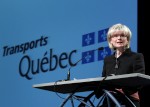
Québec Minister of Transport, Ms. Julie Boulet
First of all, allow me to warmly thank the World Road Association for having entrusted us with the organization of this prestigious event. The International Winter Road Congress represents a special moment for us when discussions between experts are to the forefront and when we can take the measure of the challenges faced by all countries that must ensure winter road mobility for their populations.
The Government of Québec has wanted to host this Congress for many years. So it is with great pride that today we can stand here as not just the host of the Winter Road Congress, but the first host of the Winter Road Congress in the Western hemisphere.
It is an honour to welcome you here to the City of Québec, an exceptional city which has managed to preserve its charm and its French origins over the centuries, while at the same time constantly and dynamically developing at every turn. In 2008, Québec held wonderful celebrations to mark the 400th anniversary of its foundation.
We have overcome the difficulties of winter and now take full advantage of the season’s outdoor activities that make Québec, with its wonderful open spaces, what it is.
On this subject, the Carnaval de Québec, which the mayor mentioned earlier and which is currently underway here in the city, is a perfect example. It is the largest winter carnival in the world. It is the third largest carnival of any sort in the world, following close on the heels of Rio and New Orleans. It attracts thousands of foreign and Québecker tourists year after year.
From the point of view of winter road service, the arrival of winter raises a number of challenges. Each year, all the teams at the Québec department of transport get ready to ensure that our road network of almost 30,000 km will be accessible under all conditions.
Day-to-day life is therefore adapted to suit the road and traffic conditions that affect the social and economic activities of all our citizens.
It is a big challenge, gigantic even. The province of Québec is enormous. It covers around 1.7 million square kilometres. Depending on the region, the winter lasts between 18 and 25 weeks per year and Québec receives around 300 cm of snow per year.
We are increasingly able to meet our objective of guaranteeing mobility on our roads at all times thanks to the decades of experience we have acquired in winter road service and the expertise of our teams. Our numerous exchanges with our partners here and elsewhere are also, for us, promises of continued improvement.
And all of this comes in a context in which we must deal with a marked increase in motor vehicle road traffic, the need to better protect our environment, the obligations we have relating to sustainable development and the direct effects of climate change.
Thanks to what we learned from previous winter road Congresses, we have been able to improve our efficiency in maintaining our operational road network. So, this sort of Congress forces us or allows us to become better, to learn about what other people do, what they do better than us and what we can do to reproduce their successes in our context to improve our efficiency and operational effectiveness. Step by step, we are changing our practices. We are managing to achieve substantial gains, although we must always remain vigilant and look for all ways that we can do more and do it better.
That is why the many discussions that this 13th International Winter Road Congress will bring are so important and so pertinent.
This Congress fits perfectly with the need to constantly adapt our ways of doing things according to the extremely changeable meteorological conditions, particularly during winter. It will also offer chances to share ideas and opportunities to put forward solutions that will help us offer our citizens road transport systems that perform increasingly better from the point of view of sustainable development.
I would like to thank you for being here at this Congress in such great numbers and I invite you to participate actively in the discussions. I am certain your skills, experience and expertise will guarantee that these meetings are productive.
In this respect, I would like to congratulate the organizing committee of the Congress for bringing together such high-calibre delegates here in the City of Québec. All the presentations, and the variety and pertinence of the technical sessions and other activities bear this out.
I would also like to underscore the contribution of all our partners who have worked together to create the effective and productive working conditions of this wonderful Congress.
I wish you all a successful Congress and I know that you will leave Québec with new knowledge, new friends and new perspectives. You know, a Congress such as this is a forum for sharing: sharing knowledge, sharing new technologies, sharing new ways of doing things. But it is also a great opportunity to have fun. You are here in a city whose population is wonderfully warm and welcoming. Take advantage of your stay so that you can take home some marvellous memories. So welcome to our home, I wish all of you a wonderful congress and I wish all those taking part in the discussion tables the most productive of exchanges.
Thank you very much and enjoy the Congress!
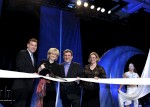
The dignitaries then officially opened the Congress, giving the floor to the Chair of PIARC Technical Committee B5 "Winter Service" and the Chair of the Organizing Committee to present the content of the Congress.
Chairperson of the Technical Committee B5, Ms. Gudrun Öberg,
and President of the Organizing Committee, Mr. Michel Boivin
Michel Boivin:
It is now my turn to welcome you to this Congress, which I am convinced, will meet all of your expectations. At the time of your registration, you received the Congress Guide, in which you will find detailed information for the three days of meetings that will begin tomorrow. What I have to say, along with Ms. Gudrun Öberg who is with me, essentially aims to give you reference points in this rich programming.
The program will start tomorrow at 8:30 a.m. with the Winter City Mayors' Session. For the first time in a winter congress of the World Road Association, a platform for the municipal world is provided to discuss winter service issues in various urban contexts. This session is a very interesting initiative for all the delegates who will be able to learn about the concerns of the elected municipal officials. I want to thank the City of Québec for accepting to take up this challenge and examine the theme of winter service and the financial governance of sustainable urban mobility.
The Ministers' Session will immediately follow and focus on the following issue: how to promote winter mobility adapted to the climate? In fact, road users expect a lot, and rightfully so. The mission of governments, and particularly all the departments and public bodies responsible for transportation is to ensure, in their area, the sustainable mobility of people and goods under any circumstance.
For countries that have to accept this responsibility in winter conditions of snow and ice storms, it is a huge challenge and sometimes costly. At this point, governments are called upon to, in a sustainable development perspective; promote a winter mobility adapted to the climate that is different from mobility during other seasons. Tomorrow you will find out about the vision of Québec, Canada, Spain, Andorra, Morocco, and Korea on this issue.
These two plenary sessions are taking place in the same room, on level 2 of the Convention Centre. Also on this floor, you will find the Speaker Ready Room, in yellow on the map, where every delegate must come review their presentation the day before, as well as 3 out of the 5 technical sessions rooms, in green on the map. To talk a bit about the technical sessions, I am giving the floor to Ms. Gudrun Öberg, Chair of the B5 Committee and responsible for the technical program.
Gudrun Öberg:
Thank you. Indeed, we have 3 rooms in level 2. And we have 2 rooms in level 3 for the technical sessions. So we will have 5 parallel sessions going on during the 3 days we have here. On behalf of PIARC Technical Committee B5 “Winter Service”, I would like to welcome all of you from different parts of the world. The role of our technical committee in this event has been to prepare the technical sessions, to evaluate all abstracts and later all papers, to prepare sessions with a certain theme for the different sessions.
I can tell you that you have some very interesting days in front of you. I have read all abstracts so I know that it will be interesting, so visit as many sessions as possible. There are 6 topics with 28 oral sessions including 111 presentations and about 50 % of those will also have a poster presentation. We have also 2 sessions with country reports from Snow and Ice Data Book in all 6 presentations.
Together all these cover many aspects of winter service. So now, let me give you information about the sessions.
In topic 1 “Winter Service Planning, Management and Implementation”, we have 6 different sessions here to about “Overview of National Strategies and Policies”, 2 also about “Winter Maintenance Managements methods”, 1 about “Interaction Between Road Users and Agencies”, and the last one “Challenges of Contracting”.
In the topic 2, “Safety and Mobility in Winter: Social Environmental and Economic Aspects”, there we have 4 different sessions. The first one “Accident and Traffic Flow Analysis”, “Optimized Driver Information for Better Road Safety”, “Special Traffic Problems and Solutions in Wintertime”, and the last one “Sustainable Winter Maintenance in Road Tunnels”.
In the third topic “Winter Service Information Systems”, we have also 6 sessions: one about “Monitoring and Observing Weather and Road Conditions”, 1 about “Forecasting Weather and Road Conditions”, and 2 about “Decision Support Systems” and also 2 about “Vehicle-based Technologies”.
And in topic 4, “Snow and Ice Control Techniques and Technologies” we have 7 sessions: 2 about “Innovative Techniques for Snow Removal”, 1 about “The Environmental and Snow Control”, another one about “Techniques for the Application of Deicing Chemicals”, “Measurement of Pavement Surface Condition”, “Analysis of the Spread Rate of Chemical Deicers” and “Prevention of Dealing with Snow and Ice”.
In the fifth topic, “Winter Service and Sustainable Transportation”, we have 4 sessions. The first one is “Salt and the Road Right-of-Way”, the second, “Alternatives to Salt and Salt Quality”, the third, “Salt, Snow-Sustainable Options” and the fourth, “History of Maintenance in Various Countries”.
And in topic 6, “Winter Service and Climate Change Impacts”, we have just one session with the same name as this is a new topic.
In the Congress bag, you have all the details about the presentations in the different sessions. But the technical program is larger than technical sessions, isn’t it, Mr. Boivin?
Michel Boivin:
That's right. To complement the Congress' sessions’ program, some of you have decided to sign up for the technical visits on Wednesday afternoon.
Various partners from the ministère des Transports, Québec Department of Transport, will provide you with a variety of technical visits. All of the sites are close to the Convention Centre: therefore you will have more time to visit the sites and talk with experts that you meet.
I will give you the list of the sites: Service Centres, which conducts maintenance operations, an integrated traffic management centre, an emergency response centre, a snow melting facility, a waste snow disposal facility, a ferry crossing and airport runways. We wanted to include the broadest area of transportation possible and invite you to discover other ways to accommodate the transportation of road users and the reality of winter. The cities of Québec and, on the south shore, Lévis open their doors to you. In all these visits, you will notice that the concerns are the same and they are the ones at the heart of this Congress: providing service to road users, and environmental concerns.
From a purely logistical point of view, I want to bring your attention to the fact that, to ensure quality visits, most of the groups are small. This forces us to organize many visits, on rotation, for the same site. Time management is therefore important so that everyone can make the most of their afternoon. I want to thank you in advance for following the schedules of the visit that you have signed up for.
These visits are an opportunity to discuss with colleagues in a more informal way than at a technical session. In this same view, we also provide you with the opportunity to participate in the poster sessions. Ms. Öberg will talk more about this.
Gudrun Öberg:
The poster sessions are included in the area of the exhibition to increase the exchanges: all the coffee breaks are also in the area of the exhibition. And the poster sessions will be in the green part as you can see on this slide. On Tuesday, we have posters in all 6 topics and the other 2 days, in Topic 1 to 5. And in all we have 71 posters.
Michel Boivin:
To conclude, I want to remind you that the exhibition area that you see here is where all the meetings take place. At the centre of the exhibition, in black on the map, you will find 11 national pavilions, concentrated around a large hallway: Italy, France, Spain, Andorra, the Nordic countries, Sweden, Japan, Korea, the United-States and of course, Canada and Québec. We encourage you to visit this area between sessions to meet the 130 exhibitors. During the 3 days, the visits will allow you to get an overview of the world of winter road maintenance practices and policies. The exhibitors will show you the latest technologies. On the west side of the room, the other black rectangle on the map, you will be able to see equipment that you may not have seen before and I think you will be surprised in many ways.
As you can see from the outline on the map, we have organized this space into many areas. In green, you have the location for the poster sessions. In blue, all of the service areas for delegates, an information point, for any question you may have. There is also free Internet access centre and food and coffee break areas.
As a complement to this interior exhibition of vehicles and equipment, you can see some of this equipment in action on Wednesday afternoon. You can also validate the performance of some equipment. At the same site, Baie de Beauport, located about 10 minutes from here, the first International Snowplow Championship will be held.
Twenty competitors from all continents are registered for this major first. Snowplow drivers from Québec, various provinces in Canada, the United States, France, Sweden, Andorra, Korea and Morocco will face each other through friendly competition in an obstacle course after conducting a mechanical inspection of their vehicle.
This will allow us to learn about the skill of these drivers, without whom our streets would stay covered in snow, no matter the relevance of our winter road service policies.
On Wednesday, we will have the pleasure of ending the day with a very enjoyable banquet and show.
We talked about the environment a little earlier, to add to the outline of this Congress, I want to let you know that it is eco-responsible. In fact, we wanted to do our part in the organization of this event by doing everything to reduce greenhouse gas emissions, limit waste and stimulate the local economy. You can see all the actions we took by going to the Congress' Web site. We hope that we can count on you to help us in this initiative by avoiding wasting paper and by using the recycle bins.
I want to thank you for your attention and I will see you again Thursday at noon for the Closing Session of the Congress, during which Ms. Gudrun Öberg will share the conclusions of these few days, which I hope will be enjoyable and rewarding.
Thank you everyone!
The opening ceremony ended beautifully with the acrobats and dancers returning to the stage, after which the doors to the Congress exhibition were officially opened.
|
To facilitate reading of the text, the masculine is used without any discriminatory intent. |
